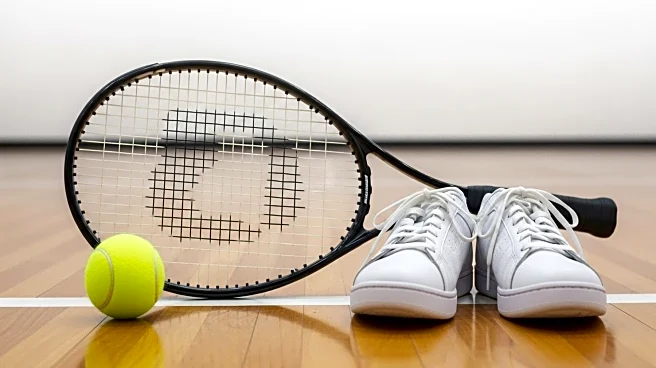What's Happening?
Emma Raducanu, the British No. 1 tennis player, has revealed that her new coach, Francisco Roig, is helping her to avoid being a perfectionist as she prepares for the second round of the US Open. Raducanu secured a swift victory against Japanese qualifier Ena Shibahara, winning 6-1, 6-2 in just 62 minutes. This marks a significant change in her coaching strategy, as she has spent much of the season without a permanent coach. Roig, who previously coached Rafael Nadal, joined Raducanu's team earlier this month after a successful trial period. Raducanu has expressed satisfaction with Roig's approach, noting his ability to maintain calm and composure, which reassures her that their efforts will yield results over time. This coaching change comes after Raducanu's previous coach, Sebastian Sachs, stepped back for health reasons, and follows a series of coaching changes throughout her career.
Why It's Important?
The partnership between Emma Raducanu and Francisco Roig could have significant implications for her performance in the US Open and future tournaments. Roig's experience with top players like Rafael Nadal may provide Raducanu with the strategic insights needed to enhance her game. This change in coaching style, focusing on gradual improvement rather than immediate perfection, could help Raducanu manage the pressures of high-stakes competitions. As Raducanu continues to refine her skills, her ability to compete against top-ranked players like Aryna Sabalenka may improve, potentially leading to deeper runs in major tournaments. This development is crucial for Raducanu's career trajectory, as consistent performance could solidify her status as a leading figure in women's tennis.
What's Next?
Emma Raducanu is set to face another qualifier, Janice Tjen, in the second round of the US Open. The match will be broadcast live, providing an opportunity for Raducanu to demonstrate the effectiveness of her new coaching strategy. As she progresses in the tournament, Raducanu's performance will be closely watched by tennis analysts and fans, who are eager to see if Roig's influence can lead to sustained success. Additionally, Raducanu's ability to adapt to Roig's coaching style may influence her future decisions regarding coaching partnerships, potentially impacting her long-term career development.
Beyond the Headlines
Emma Raducanu's coaching changes highlight the challenges faced by young athletes in managing their careers and the pressures of professional sports. The frequent shifts in her coaching team reflect the search for the right balance between technical guidance and personal support. This situation underscores the importance of mental resilience and adaptability in sports, as athletes must navigate both physical and psychological demands. Raducanu's openness to new coaching methods may inspire other players to explore diverse strategies for improvement, emphasizing the evolving nature of sports training and development.









